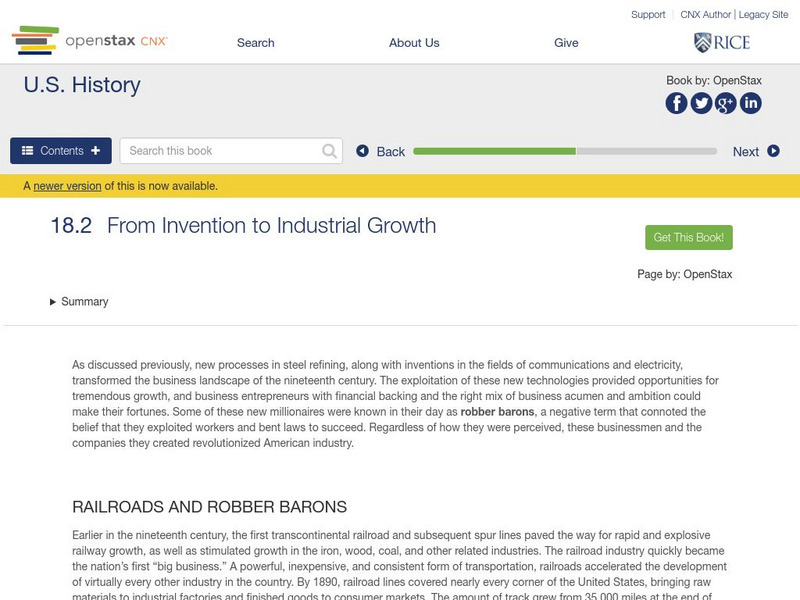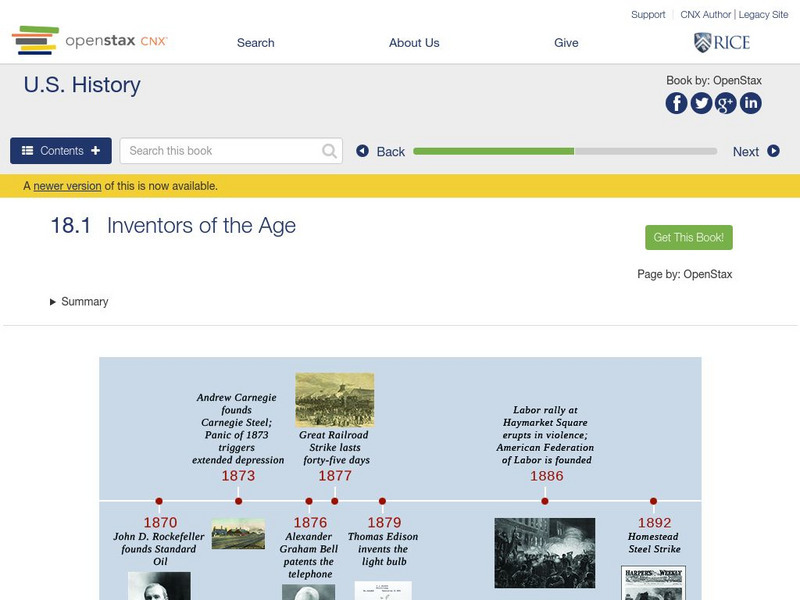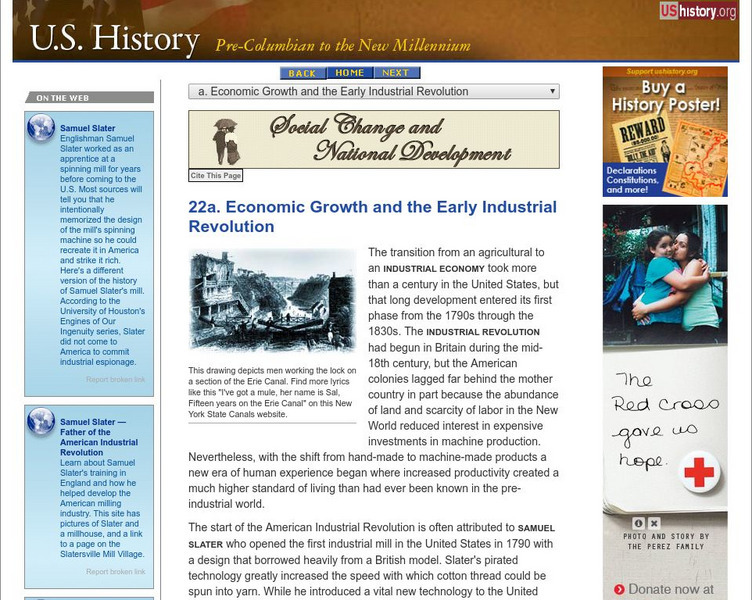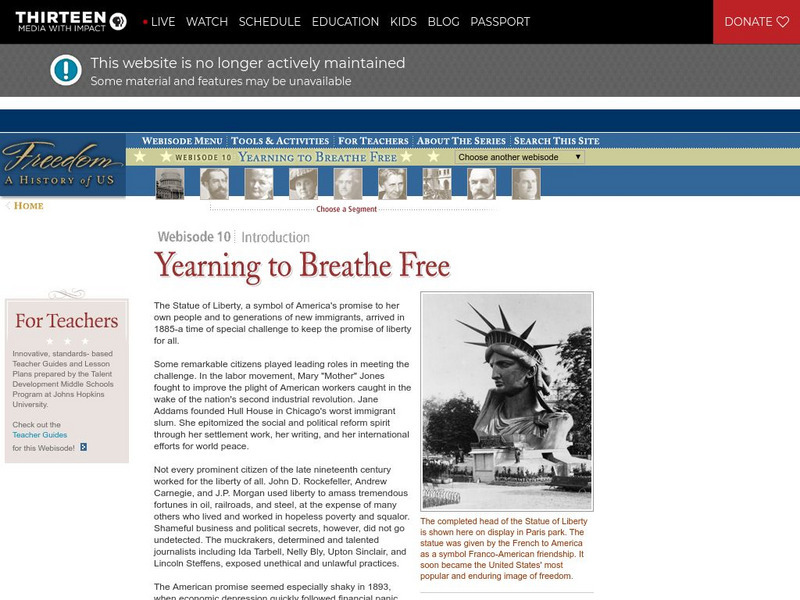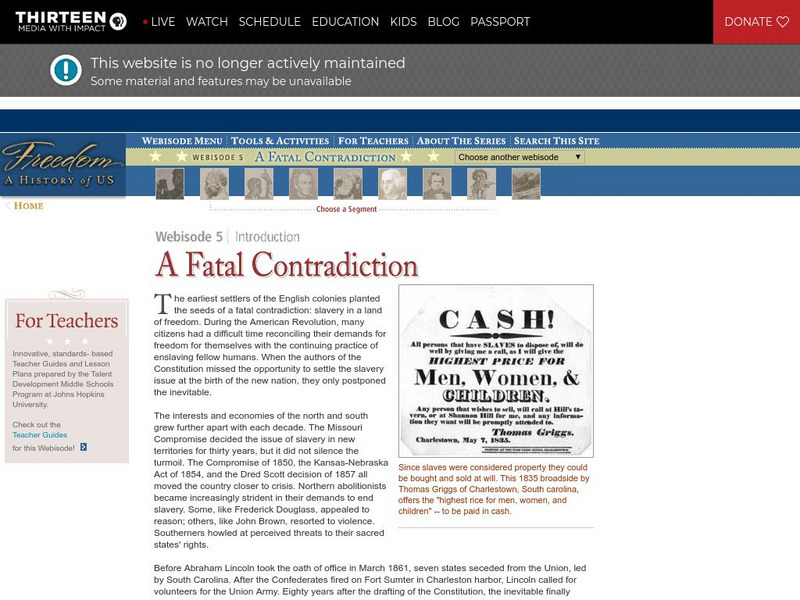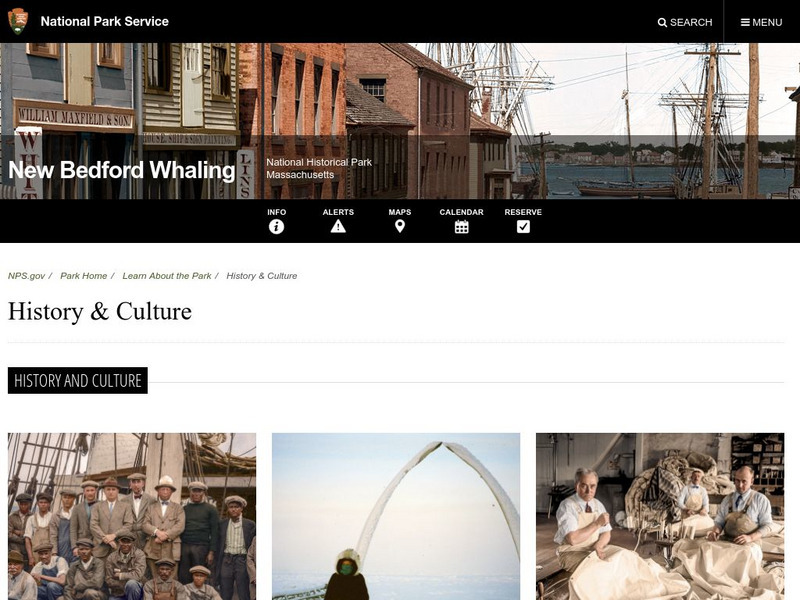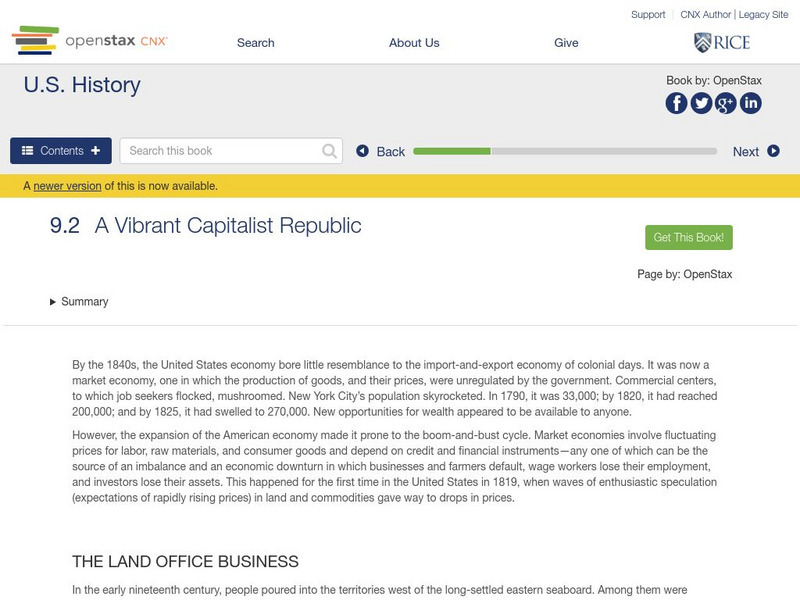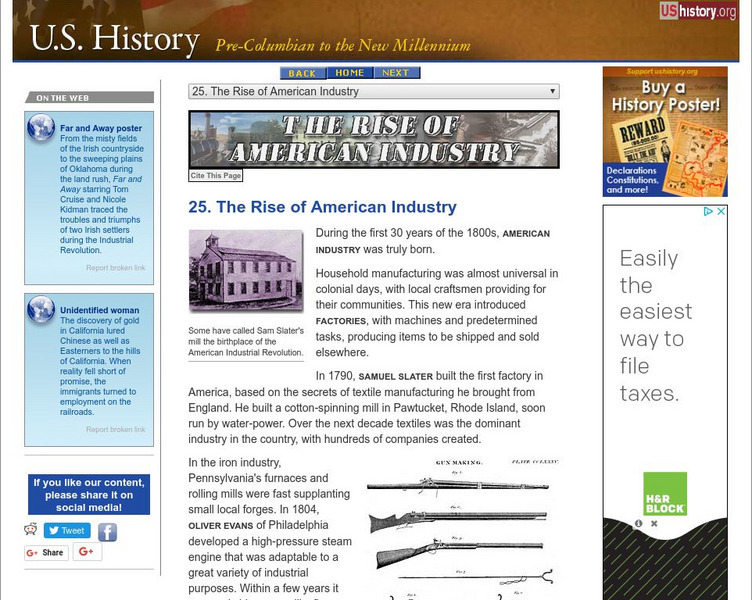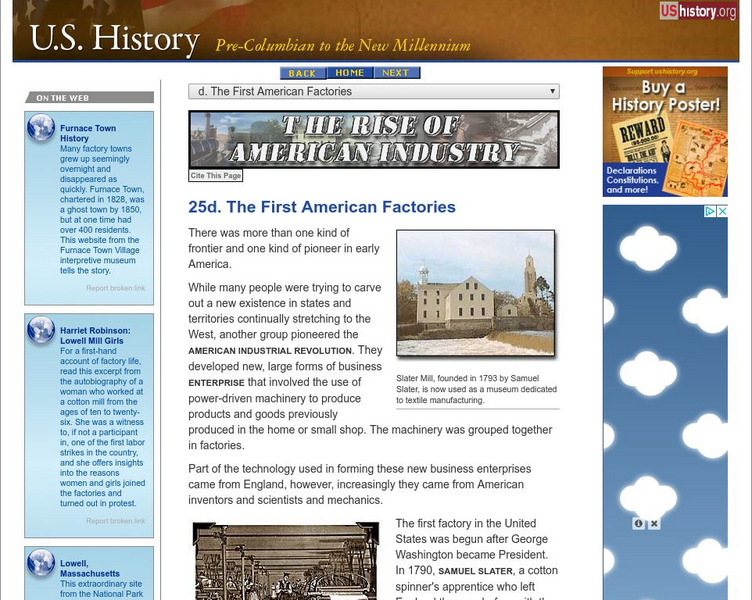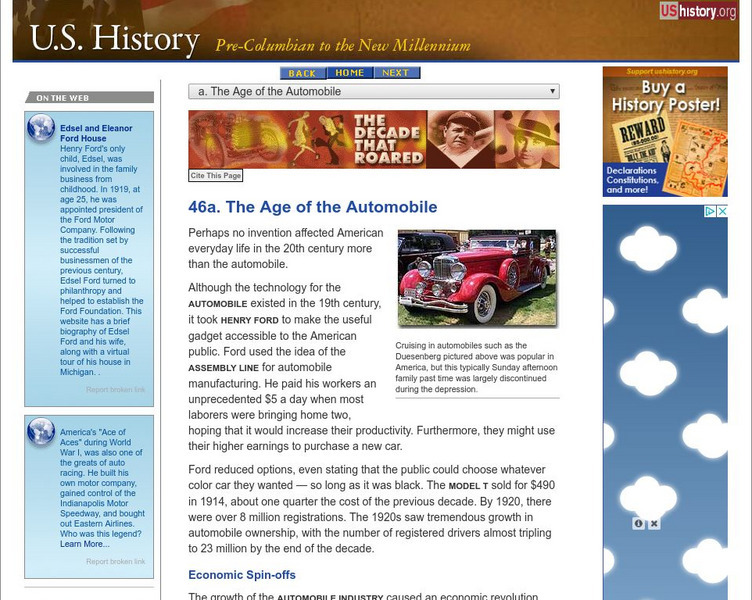Hi, what do you want to do?
Khan Academy
Khan Academy: Us History: 1865 1898: Immigration and Migration in the Gilded Age
A quick comprehension check over immigration and migration in the Gilded Age.
Other
Modern World History: Effects of the Industrial Revolution
In this textbook unit, students learn about working and living conditions during the Industrial Revolution, the growth of cities, public health issues that emerged, child labor, the impact of factory work on families and on women, the...
OpenStax
Open Stax: Industrialization 1870 1900: From Invention to Industrial Growth
This section of the textbook describes how new inventions spurred industrial growth in the 19th century and discusses the business methods and models of Andrew Carnegie, John Rockefeller, and J. P. Morgan.
OpenStax
Open Stax: Industrialization: Building Industrial America on the Backs of Labor
Learn about the lives of the working class in Industrial America, what led to the formation of labor unions, and why labor unions were not successful despite strike actions.
OpenStax
Open Stax: Transformation in North 1800 50: Early Industrialization Northeast
Examines the transformation of work from artisan-centered to a mechanized workforce. Looks at the emergence of industrialization and the impact it had on production and on the worker experience, the development of the consumer society,...
OpenStax
Open Stax: Industrialization and Big Business, 1870 1900: Inventors of the Age
In the Industrial Revolution, new products and inventions spurred the growth of big business. Learn about some of these inventions and the people who created them, for example, Alexander Graham Bell and Thomas Edison.
ClassFlow
Class Flow: Cause and Effect With Us History
[Free Registration/Login Required] What is cause and effect? This flipchart explains cause and effect with simple examples leading to more in-depth examples in US history from the Industrial Revolution, immigration, and Westward expansion.
Independence Hall Association
U.s. History: Economic Growth and the Early Industrial Revolution
A very thorough look at the industrial growth in the North because of the advent of the Industrial Revolution in America. See what industries grew, how factories became more productive, and find out how the states cultivated economic...
Other
Interactive Learning Center: Dow Jones Industrial Average
This interactive learning center teaches about the history of the Dow Jones Industrial Average (DJIA). Complete with graphs, charts, history timelines, and quizzes.
Other
America's Best History: u.s. Timeline the 1900s
An illustrated timeline of events of the United States, which depicts a time of industrial purpose.
The History Cat
The History Cat: Triangle Shirtwaist Fire
Looks at the garment factory industry in the 1800s and the early part of the 20th century, where workers toiled in sweatshop conditions. After a terrible fire at the Triangle Shirtwaist Company in 1911, labor unions gained support in...
PBS
Wnet: Thirteen: Freedom: A History of Us: Wake Up, America!
This resource covers the changing of America due to the Industrial Revolution which brought in not only new technology but also opened the door to reform movements. From the series by Joy Hakim, "A History of Us." Includes a teacher's...
PBS
Wnet: Thirteen: Freedom: A History of Us: Yearning to Breathe Free Webisode 10
This wonderful website, Freedom, a History of US, based on the series by Joy Hakim, presents the tenth webisode, Yearning to be Breathe Free. Through text, photographs, and audio segments you can get a good picture of the state of...
PBS
Wnet: Thirteen: Freedom: A History of Us: A Fatal Contradiction Webisode 5
Webisode 5 - A Fatal Contradiction. The history of the United States is presented in a series of webisodes, within each are a number of segments.Included are links to lesson plans, teacher guides, resources, activities, and tools.
Curated OER
National Park Service: New Bedford Whaling Historical Park: History & Culture
This national park site offers insight into the economic stimulus whaling brought to New England and has left behind a strong history for that region.
OpenStax
Open Stax: A Vibrant Capitalist Republic
By reading this section of a chapter on "Industrial Transformation in the North," students will be able to explain the process of selling western land, discuss the causes of the Panic of 1819, and identify key American innovators and...
Indiana University
Us Steel Gary Works Photograph Collection
This resource presents the harsh realities of the U.S. steel production heritage.
Other
City History of Wilmington, Delaware
Read about the history of Wilmington, Delaware, and the growth of industry in that city.
Independence Hall Association
U.s. History: The Rise of American Industry
The Industrial Revolution came to America, smuggled in by Samuel Slater, who brought plans for a cotton-spinning mill. See how the growth of industry led to the growth of corporations, the growth of the nation geographically, and the...
Independence Hall Association
U.s. History: The Gilded Age
The United States had an industrial resurgence after the Civil War. Read about the growth of big business in many areas and the men associated with these businesses. See also the people who did not prosper during this time and evaluate...
Independence Hall Association
U.s. History: The First American Factories
The growth of cities and the American economy in the first half of the 19th century was driven by the growth of factories. Read about the textile industry in New England and how manufacturing spread throughout the north.
Independence Hall Association
U.s. History: The Age of the Automobile
Henry Ford's use of the assembly line to manufacture his automobiles led to many ramifications. Read about the spin-off industries created by the growth of the automobile industry, and see what impact the auto had on culture.
Council for Economic Education
Econ Ed Link: Stock Market Price History
Each of us seek to make wise investment decisions that will make our money grow. Unfortunately, we cannot predict the future, but the past can give us a window to understanding the risks and rewards of investing in the stock market. This...







